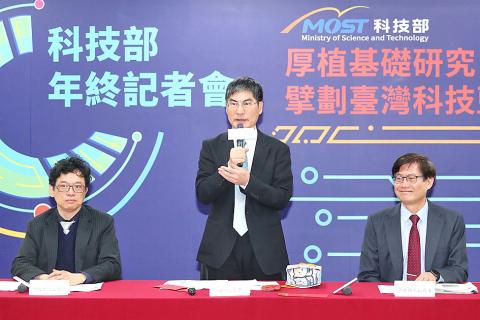Minister of Science and Technology Chen Liang-gee (陳良基) used an annual lunar-year-end news conference in Taipei to outline the government’s plans to boost the nation’s technological competitiveness, including a new subsidy program for outstanding doctoral students in key technology fields.
The Ministry of Science and Technology’s budget this year is NT$38.8 billion (US$1.26 billion), up from last year’s NT$36.5 billion — which had been an eight-year low, and it would continue striving to boost its budget for basic research, Chen said.
To draw up a road map for the nation’s technological development, the ministry has advised the Executive Yuan to move up the 11th national science and technology conference to this year, instead of next year, and it would host several preparatory meetings to collect opinions prior to the conference, he said.

Photo: CNA
Taiwan has a shortage of people in fields related to biotechnology and digital transition, including gene sequencing, manufacturing, artificial intelligence and the Internet of Things, and quantum computing, he said.
The number of students in doctoral programs related to information and communication technologies has declined by 45 percent over the past decade, Chen said.
Executive Yuan data showed that in 2017, almost 736,000 Taiwanese moved abroad for work, with 55 percent going to China, 13.7 percent to the US and 14.8 percent to Southeast Asian countries.
To encourage Taiwanese to pursue higher degrees, the ministry plans to offer monthly subsidies of NT$30,000 to NT$50,000 to 600 outstanding doctoral students every year, so they will not have to worry about earning money, he said.
Hopefully, the subsidy program will be in place before September, but his ministry needs further talks with the Ministry of Education about dividing the expenditure, he said.
Local companies should boost salary levels and improve working conditions and career advancement to help curb the brain drain, as well as providing schools with more resources to cultivate talented individuals, Chen said.
Many other nations, including Israel, France and the UK, have expressed an interest in recruiting Taiwanese high-tech talent, so students should be willing to move outside their comfort zones and apply for overseas training projects, he said.
The science ministry’s plan to send Taiwanese to intern at Uber’s San Francisco headquarters would start as soon as there are enough qualified applicants, he said.
Taiwanese often impress foreign tech firms with their solid academic training, but they should strengthen their oral presentation skills to gain an edge, he added.

AIR SUPPORT: The Ministry of National Defense thanked the US for the delivery, adding that it was an indicator of the White House’s commitment to the Taiwan Relations Act Deputy Minister of National Defense Po Horng-huei (柏鴻輝) and Representative to the US Alexander Yui on Friday attended a delivery ceremony for the first of Taiwan’s long-awaited 66 F-16C/D Block 70 jets at a Lockheed Martin Corp factory in Greenville, South Carolina. “We are so proud to be the global home of the F-16 and to support Taiwan’s air defense capabilities,” US Representative William Timmons wrote on X, alongside a photograph of Taiwanese and US officials at the event. The F-16C/D Block 70 jets Taiwan ordered have the same capabilities as aircraft that had been upgraded to F-16Vs. The batch of Lockheed Martin

GRIDLOCK: The National Fire Agency’s Special Search and Rescue team is on standby to travel to the countries to help out with the rescue effort A powerful earthquake rocked Myanmar and neighboring Thailand yesterday, killing at least three people in Bangkok and burying dozens when a high-rise building under construction collapsed. Footage shared on social media from Myanmar’s second-largest city showed widespread destruction, raising fears that many were trapped under the rubble or killed. The magnitude 7.7 earthquake, with an epicenter near Mandalay in Myanmar, struck at midday and was followed by a strong magnitude 6.4 aftershock. The extent of death, injury and destruction — especially in Myanmar, which is embroiled in a civil war and where information is tightly controlled at the best of times —

Taiwan was ranked the fourth-safest country in the world with a score of 82.9, trailing only Andorra, the United Arab Emirates and Qatar in Numbeo’s Safety Index by Country report. Taiwan’s score improved by 0.1 points compared with last year’s mid-year report, which had Taiwan fourth with a score of 82.8. However, both scores were lower than in last year’s first review, when Taiwan scored 83.3, and are a long way from when Taiwan was named the second-safest country in the world in 2021, scoring 84.8. Taiwan ranked higher than Singapore in ninth with a score of 77.4 and Japan in 10th with

China's military today said it began joint army, navy and rocket force exercises around Taiwan to "serve as a stern warning and powerful deterrent against Taiwanese independence," calling President William Lai (賴清德) a "parasite." The exercises come after Lai called Beijing a "foreign hostile force" last month. More than 10 Chinese military ships approached close to Taiwan's 24 nautical mile (44.4km) contiguous zone this morning and Taiwan sent its own warships to respond, two senior Taiwanese officials said. Taiwan has not yet detected any live fire by the Chinese military so far, one of the officials said. The drills took place after US Secretary